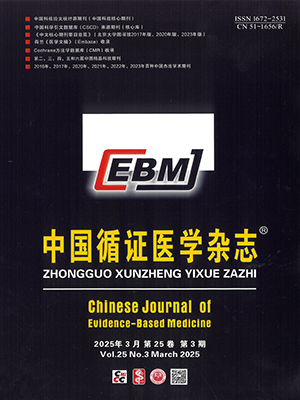| 1. |
中华人民共和国国务院. “十三五”国家老龄事业发展和养老体系建设规划的通知, 2017-03-06. Available at: http://www.mca.gov.cn/article/gk/ghjh/201804/20180400008485.shtml.
|
| 2. |
谢姣, 高艳斌. 社区老年人认知功能及其影响因素的相关性. 中国老年学杂志, 2010, 30(24): 3759-3761.
|
| 3. |
孟昱林, 张海艳, 王金环, 等. 唐山市 826 例老年人认知功能调查及相关因素分析. 中国老年学杂志, 2014, (9): 2531-2533.
|
| 4. |
潘惠英, 王君俏, 李淑华, 等. 金华市社区老年人轻度认知功能障碍的患病率调查及影响因素分析. 中国实用护理杂志, 2012, 28(31): 80-82.
|
| 5. |
陶雪琴, 廖雄, 李梦倩, 等. 社区老年人轻度认知功能障碍的流行病学调查. 中国老年学杂志, 2016, 36(13): 3283-3286.
|
| 6. |
吴越, 姚建军, 程灶火, 等. 无锡市社区老年人轻度认知功能障碍调查及其影响因素分析. 现代预防医学, 2017, 44(2): 259-263.
|
| 7. |
柳华, 王文敏, 隆昱洲, 等. 血管性非痴呆认知功能障碍 (V-CIND). 中国神经精神疾病杂志, 2008, 34(8): 509-511.
|
| 8. |
中国防治认知功能障碍专家共识专家组. 中国防治认知功能障碍专家共识. 中华内科杂志, 2006, 45(2): 171-173.
|
| 9. |
科学网. 《老年痴呆症研究取得系列进展》, 2020-05-20. Available at: http://news.sciencenet.cn/htmlnews/2018/3/405702.shtm.
|
| 10. |
黄武全, 陆媛, 于德华. 上海市某近郊城区老年人轻度认知障碍患病率及其影响因素分析. 中国医药导报, 2019, 16(21): 59-63, 68.
|
| 11. |
曾宪涛, 刘慧, 陈曦, 等. Meta 分析系列之四: 观察性研究的质量评价工具. 中国循证心血管医学杂志, 2012, 4(4): 297-299.
|
| 12. |
Prins J, Blanker MH, Bohnen AM, et al. Prevalence of erectile dysfunction: a systematic review of population-based studies. Int J Impot Res, 2002, 14(6): 422-432.
|
| 13. |
刘芸, 董永海, 李晓云, 等. 中国 60 岁以上老年人睡眠障碍患病率的 Meta 分析. 现代预防医学, 2014, 41(8): 1442-1445, 1449.
|
| 14. |
梁维萍, 曲成毅, 马菲. 太原市社区老年人轻度认知功能障碍现况调查. 中国慢性病预防与控制, 2008, 16(2): 174-175.
|
| 15. |
方桂珍, 陈雪萍, 杨立江. 925 名社区老年人轻度认知功能损害患病率及影响因素分析. 中华老年医学杂志, 2009, 28(6): 512-515.
|
| 16. |
Wang YM, Song M, Yu LL, et al. Mild cognitive impairment: vascular risk factors in community elderly in four cities of Hebei Province, China. PloS One, 2015, 10(5): e0124566.
|
| 17. |
陈玉明, 刘寒, 冯辉, 等. 上海中心城区社区老人认知功能损害情况调查. 中国康复医学杂志, 2015, 30(4): 391-392.
|
| 18. |
Su XN, Shang L, Xu QL, et al. Prevalence and predictors of mild cognitive impairment in Xi’an: a community-based study among the elders. PloS One, 2014, 9(1): e83217.
|
| 19. |
杨玉欢, 程光文, 荣爽, 等. 黄石市社区老年人轻度认知功能障碍的现况调查. 中华疾病控制杂志, 2017, 21(8): 767-771.
|
| 20. |
张雪晴, 曾慧. 长沙市社区老年人轻度认知功能障碍患病率调查及相关因素分析. 中国全科医学, 2014, 17(9): 1031-1035.
|
| 21. |
苏向妮, 化前珍, 张磊, 等. 西安市社区老年人轻度认知障碍的影响因素分析. 护理学报, 2013, 20(11): 6-9.
|
| 22. |
傅伟忠, 瞿正万, 张明, 等. 630 例老年人认知功能缺损状况调查及早期干预模式初探. 上海预防医学, 2008, 20(7): 337-338.
|
| 23. |
吴文静, 刘宇, 彭荣立, 等. 北京市新中街社区 193 名老年人认知功能状况的调查. 中华现代护理杂志, 2015, (25): 3026-3028, 3029.
|
| 24. |
刘淼, 王建华, 吴蕾, 等. 城乡两社区老年人群轻度认知功能障碍的患病状况. 上海预防医学, 2018, 30(1): 32-37.
|
| 25. |
李杰, 屈光波, 秦其荣, 等. 老年人心理弹性与认知功能受损的相关性. 中华行为医学与脑科学杂志, 2019, 28(10): 935-940.
|
| 26. |
康雅琴, 刘春雷, 朱红, 等. 2015 年松滋市老年人早期认知功能障碍流行病学调查及影响因素分析. 实用预防医学, 2016, 23(12): 1473-1476.
|




